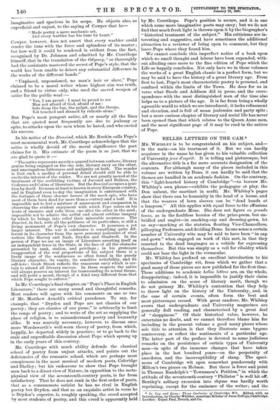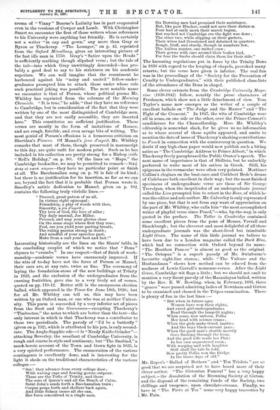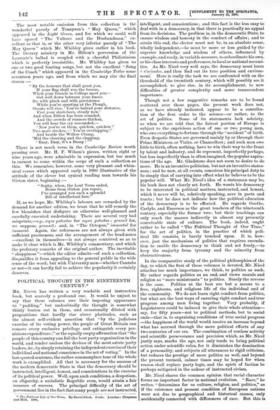BELLES LETTRES ON THE CAM.*
Ma. WHIBLEY is to be congratulated on his subject, and— in the main—on his treatment of it. But we can hardly
acquiesce in the name he has given to his valuable collection of University jeux d'esprit. It is telling and picturesque, but the alternative title is a far more accurate designation of the contents. For although many of the pieces included in this volume are written by Dons, it can hardly be said that the themes are handled in an academic fashion. On the contrary, this "light-hearted history of Cambridge "—to borrow Mr. Whibley's own phrase—exhibits the pedagogue at play, the Don unbent, the martinet in mufti. Mr. Whibley's pages show that there can be humanity in the head of a house, and that the wearers of lawn sleeves can be "dead hands at a lampoon." All this applies with equal force to the effusions of the undergraduate Muse. She does not figure en grande Jenne, as in the faultless heroics of the prize-poem, but un- bridled and ungirt—in smoking-cap and dressing-gown, let us say—mocking at the statutes, flouting Vice-Chancellors, pillorying Professors, and deriding Dons. In one sense a certain number of University wits may be said to have been "in cap and gown" when engaged on work of this sort, in that they resorted to the dead languages as a vehicle for expressing themselves. But this was simply as a veil for ribaldry which could not bear the light in the vernacular.
Mr. Whibley has prefixed an excellent introduction to his specimens of Cambridge wit, from which we gather that a good many of these pieces are now published for the first time. These additions to academic belles lettres are, on the whole, disappointing ; indeed, it is impossible to justify their claim to admission on the score of literary merit, though we do not gainsay Mr. Whibley's contention that they help to throw light on the history of the University,. and, in the ease of certain events, often form the best and most picturesque record. With great candour, Mr. Whibley avows that undergraduate and University magazines are generally dull reading, and characterised by a great deal of " shoppiness." Of their historical value, however, he entertains no doubt, and we cannot therefore blame him for including in the present volume a good many pieces whose sole title to attention is that they illustrate some bygone controversy, or reflect the sentiments of a particular age. The latter part of the preface is devoted to some judicious remarks on the persistence of certain types of University men—in spite of the immense changes that have taken place in the last hundred years—on the perpetuity of anecdotes, and the incorruptibility of slang. The speci- mens of Cambridge wit open somewhat ponderously with Milton's two pieces on Hobson. But there is force and point in Thomas Randolph's "Townsmen's Petition," in which the attitude of the seventeenth-century " Philister " is well hit off. Bentley's solitary excursion into rhyme was hardly worth reprinting, except for the eminence of the writer; and the
• /a Cap and Gown: Three Centuries of Cambridge Wit. Edited, with an Introduction, by Charles Whibley, sometime Scholar of Jesus College, Cambridge. London : Began Paul, Trench, and Co.
aroma of " Vinny " Bourne's Latinity has in part evaporated
even in the versions of Cowper and Lamb. With Christ9pher Smart we encounter the first of those writers whose references
to his University were anything but friendly. He is certainly not a writer "in cap and gown," any more than Gray or Byron or Thackeray. "The Lounger," on p. 42, reprinted from the Oxford Miscellany, gives an interesting picture of the fast idle man in 1750. Gray's "Satire upon the Heads" is sufficiently scathing though slipshod verse ; but the tale of the tub—into which Gray unwittingly descended—has pro- bably a good deal to say to his strictures on his academic superiors. We can well imagine that the resentment he harboured against his "noisy and uncivil" fellow-under- graduates prompted him to attack those under whose rule such practical joking was possible. The next notable name we encounter is that of Porson, whose political poems Mr. Whibley has reprinted from the columns of the Morning Chronicle. "It is true," he adds, "that they have no reference to Cambridge, but in consideration of the fact that they were written by one of the most distinguished of Cambridge men, and that they are not easily accessible, they are inserted here." This constitutes no sufficient justification. These
verses are mostly in the form of imitations of Horace, and are rough, forcible, and even savage bits of writing. The most genial of Porson's effusions is a humorous criticism on Sheridan's Pizarro. Of Mansel's jeux d'esprit, Mr. Whibley remarks that most of them, though preserved in manuscript to this day, are quite unfit for modern print. Such as he has included in his collection are pretty strong for a Bishop (vide "Hell's Holiday," on p. 80). Of the lines on "Maps," the Cambridge bookseller, we may be permitted to remark—m4 cireipti sarci zosttsp—they have no particular point or finish at all. The Bacchanalian song on p. 92 is fair of its kind ; but there is no justification for its insertion, so far as we can see, beyond the fact that it is probable that Porson wrote it. Smedley's satiric dedication to Hansel, given on p. 102, contains the following truly vitriolic lines :— " Proceed, great patron of us all, In virtues right episcopal :
Friendship, a play of words with thee, Sincerity, a jeu &esprit ;
Thy love of God, the love of Biller; Thy daily manual, Joe Miller.
Proceed, and may your glories close On the same stage where first they rose ; Feel, ere you yield your parting breath, The ruling passion strong in death; And mindful of your speeches past, Make from a cart your best and last !"
Interesting historically are the lines on the Sizars' table, in the concluding couplet of which we notice that " Dons " rhymes to "crumbs." In one respect—that of finish of work- manship—academic verses have enormously improved. If
the wits of to-day have not the force of Porson or Mansel, their ears are, at any rate, twice as fine. The ceremony of laying the foundation-stone of the new buildings at Trinity in 1823, and the exclusion of the undergraduates from the ensuing festivities, gave rise to a very lively set of verses, quoted on pp. 110-12. Better still is the anonymous election ballad, which appeared in the Times for June 16th, 1826; but
• for all Mr. Whibley can tell us, this may have been written by an Oxford man, or one who was at neither Univer- sity. This poem is succeeded by a very inferior set of pieces from the Snob and the Gownsman—excepting Thackeray's "Timbuctoo," the notes to which are better than the text—the only interest in which is that Thackeray was a contributor to these two periodicals. The parody of "I'd be a butterfly" (given on p. 132), which is attributed to his pen, is only second- rate. The Anglo-Sapphic ode—a is "Needy Knife-Grinder"- attacking Beverley, the assailant of Cambridge University, is rough and coarse in style and sentiment; but "The Snobiad," a mock-heroic account of the Town and Gown fight in 1835, is a very spirited performance. The enumeration of the various contingents is excellently done, and is interesting for the light it sheds on the traditional characteristics of the various colleges :— " See ! they advance from every college door; With waving caps and flowing gowns outpour. These are the Tufts of Trinity, and these The sons of Queen's and all the Bunch of Caius. Saint John's sends forth a Bacchanalian train ; Corpus peeps forth and skelters back again, And little Sidney issues all she can, Her force concentred in a single man. Six Downing men had promised their assistance, But, like poor Blucher, could not save their distance. Four had at early morn their march begun, But reached not Cambridge ere the fight was done ; The other two, while slipping on their garters, Their wives had threatened and detained in quarters. Rough, bluff, and sturdy, though in numbers few, The Aulites muster, one united crew ; Their gowns with care around their bodies tied, For fear the Snobs should claim them for their side."
The harassing regulations put in force by the Trinity Dons in 1838 with regard to the keeping of chapels, provoked many retorts; but the verse here given is inferior. The real fun Was in the proceedings of the "Society for the Prevention of Cruelty to Undergraduates," with their published class-lists of the attendance of the Dons in chapel.
Some clever extracts from the Cambridge University Maga- zine (1839-1842) follow, notably the prose characters of Freshmen, which show not a little detachment of view. Tom Taylor's name now emerges as the writer of a couple of excellent ballads on "The Judge and the Master" and "The Fight of the Crescent." In 1847, the wits of Cambridge were all in arms, on one side or the other, over the Prince Consort's candidature for the Chancellorship. Here Mr. Whibley's editorship is somewhat slack, for he gives us no information as to where several of these squibs appeared, and omits to mention the date of issue of Thackeray's slashing contributions to Punch in connection with the controversy in question. We doubt if any high-class paper would now publish such a biting satire as "The Cambridge Address to Prince Albert," in which Thackeray freely paraphrased the Public Orator's speech. The next name of importance is that of Shilleto, but he unluckily
preferred to write most of his satires in Greek. Still, his epigrams in the vernacular were often very pointed. Mortimer
Collins's elegiacs on the boat-race, and Cuthbert Bede's dream of Coelebs are both excellent in their way; but the most finished specimens of undergraduate verse are those of Sir George Trevelyan, when the ineptitudes of an undergraduate journal called the Lion prompted him to retort in the Bear, of which he was the editor and sole author. Mr. Calverley is only represented by one piece, but that is not from any want of appreciation on the part of Mr. Whibley, who calls him "the most accomplished writer of playful verse since Praed,"—who, by-the-way, is only quoted in the preface. The Tatler in Cambridge contained some excellent pieces from the pens of Messrs. Verra,ll and Shuckburgh ; but the cleverest and most delightful of all these undergraduate journals was the short-lived but inimitable Light Green. The name of this little journal we believe to have been due to a London magazine called the Dark Blue, which had no connection with Oxford beyond its name. "The Heathen Pass-ee " is almost as good as the original. "The Octopus" is a superb parody of Mr. Swinburne's favourite eight-line stanza ; while "The Vulture and the Husbandman" shows how method can be educed from the madness of Lewis Carroll's nonsense-verses. After the Light Green, Cambridge Wit flags a little ; but we should not omit to mention a very fluent parody of the Macaulayan ballad, written by the Rev. E. W. Bowling, when, in February, 1881, three " graces " were passed admitting ladies of Newnham and Girton to be examined and classed in the Tiipos examination. There is plenty of fun in the last lines :— "But when in future ages Women have won their rights, And sweet girl-undergraduates Read through the lamp-lit nights ; When some, now unborn, Pollia Her head with science crams ; When the girls make Greek iambics And the boys black-currant jams ; When the good man's shuttle merrily Goes flashing through the loom, And the good wife reads her Plato In her own sequestered room ; With weeping and with laughter Still shall the tale be told, How pretty Pollia won the Bridge In the brave days of old."
Mr. Ropes's "Ballad of Bothers" and "Ten Triolets are CIO good that we are surprised not to have heard more of their
clever author. "The Girtonian Funeral" has a very happy subject,— the dissolution of the Browning Society at Girton, and the disposal of the remaining funds of the Society, two shillings and twopence, upon chocolate-creams. Finally, we have in "The Poets at Tea" some very happy travesties by Mr. Pain. The most notable omission from this collection is the wonderful parody of Tennyson's "May Queen," which appeared in the Light Green, and for which we could well have spared "The Vulture and the Husbandman," ex- cellent as that is, or the other very inferior parody of "The May Queen" which Mr. Whibley gives earlier in his book. The literary mimicry in Mr. Hilton's perversion of the Laureate's ballad is coupled with a cheerful Philistinism which is perfectly irresistible. Mr. Whibley has given us one or two good boating songs, but not the excellent "Song of the Coach" which appeared in the Cambridge Tatler some seventeen years ago, and from which we may cite the final stanza :—
" By the honours that shall greet you,
If your flag shall woo the breeze,
When your friends in College meet you—
Get well down between your knees.
So, with pluck and with persistence
While you're spurting at the Plough,
Shouts will rise, You've halved your distance, Fret your stretchers, steady now.' And when Ditton has been rounded, And the crowds of runners thicken, You will hear the cry resounded,— ' Now you're on them, quicken, quicken !' Two more strokes,--' You're overlapping !'
And beside the Willow Clump, 'Mid the cheering and the clapping,
'Easy, Easy, it's a Bump !
There is not much verse in the Cambridge Review worth pausing over. Mr. H. F. Wilson's pieces, written eight or nine years ago, were admirable in expression, but too much in earnest to come within the scope of such a collection as this. We remember, however, some very pleasant and whim- sical verses which appeared early in 1880 illustrative of the attitude of the clever but cynical reading man towards his Girton sister, beginning :— " Sophy, when, the Lent Term ended, Home from Girton you repair, I've arranged you such a splendid Bill of intellectual fare."
If, as we hope, Mr. Whibley's labours are rewarded by the demand for another edition, we trust that he will remedy the few blemishes that disfigure an otherwise well-planned and carefully executed undertaking. There are several very bad .Tque potentas for wqua potestas ; grum,it for, we suppose, grunnit; and, in "The Octopus," immortal for immoral. Again, the references are not always given with sufficient preciseness, and the arrangement of the head-notes —excellent in themselves—is not always contrived so as to make it clear which is Mr. Whibley's commentary, and which the prefatory remarks of the original author. The inevitable " shoppiness "—which the editor admits—of such a collection, disqualifies it from appealing to the general public in the wide sense of the word; but with University men—whether Cantabs or not—it can hardly fail to achieve the popularity it certainly deserves.




















































 Previous page
Previous page